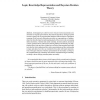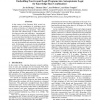3907 search results - page 39 / 782 » Time, Knowledge, and Choice |
ICSE
2008
IEEE-ACM
14 years 9 months ago
2008
IEEE-ACM
Ever-growing amounts of data that must be distributed from data providers to consumers across the world necessitate a greater understanding of the software architectural implicati...
CL
2000
Springer
14 years 1 months ago
2000
Springer
In this paper I give a brief overview of recent work on uncertainty inAI, and relate it to logical representations. Bayesian decision theory and logic are both normative frameworks...
IJCAI
2007
13 years 10 months ago
2007
In the context of the Semantic Web, several approaches to the combination of ontologies, given in terms of theories of classical first-order logic, and rule bases have been propo...
ISMB
1993
13 years 10 months ago
1993
Thoughit has been possible in the past to learn to predict DNAhydration patterns from crystallographic data, there is ambiguity in the choice of training data (both in terms of th...
COLT
2007
Springer
14 years 3 months ago
2007
Springer
The standard so-called experts algorithms are methods for utilizing a given set of “experts” to make good choices in a sequential decision-making problem. In the standard setti...


